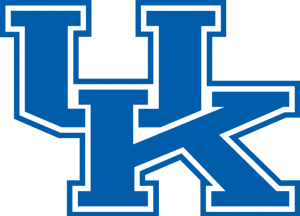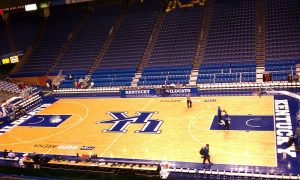Here’s Part 3 of the Top 5 Championship-Winning Men’s College Basketball Programs. Make sure to check out Parts 1 and 2.
Duke, Indiana, and North Carolina are among the most successful college basketball programs in history. But there are two programs that can say that they’ve been more successful. This article will take a look at number two on the all-time list of most championships in college basketball.
#2 Kentucky Wildcats
Winning a national championship is no easy feat. Winning eight national championships seems insurmountable. Not for the Kentucky Wildcats. The team has been to the national championship game 12 times in total. Its record through those is 8-4. Not too shabby. That record is good enough to put Kentucky in second place on the list of most winningest college basketball teams.
1948
The first of Kentucky’s championships came in 1948 under Coach Adolph Rupp. The start of the 1947-48 season was just as fantastic as the end. The Wildcats won their first seven games before losing to Temple by one point. Their regular season dominance continued all the way through to the NCAA Tournament.
They breezed through the SEC Tournament, outscoring their four opponents by 111 points. The only close game was a one point victory over Georgia Tech. The NCAA Tournament was more of the same for the Wildcats. They beat Columbia in their opener and went on to defeat Holy Cross by eight points.
The last team standing in their way was Baylor. The story would be more of the same. Right out of the gate, the Wildcats played at a blistering pace. They led 29-16 at halftime. The lead eventually evolved to 44-28, before Baylor closed the gap to 11. But that was the closest the Bears would get to Kentucky. Led by Alex Groza and Ralph Beard, Kentucky played its way to a 58-42 victory. Groza and Beard contributed 26 of Kentucky’s 58 points. Kentucky added its first national championship to the list.
1949

Photo By Kentucky Wildcats, from Wikimedia Commons
Another year, another championship for Kentucky. Coming off their NCAAM Tournament victory, Rupp and his squad were poised to repeat. Because their roster was largely intact from last season, they had a very realistic shot. Bringing back four starters from a championship team is always a promising sign. If fans thought the Wildcats were dominating during the previous season, then they’d need to invent a new word to describe the one in 1948-49.
Kentucky breezed through the regular season losing only one game. In fact, only three of the team’s regular season games were decided by 10 points or fewer. The SEC Tournament was essentially an extension of the previous years. Kentucky outscored its opponents by 123 points.
The NCAA Tournament didn’t give the Wildcats too much trouble. They defeated Villanova, 85-72, and Illinois, 76-47, on their way to a national title game against Oklahoma State. Like last year, Alex Groza led the squad. He ended the game with 25 points. Oklahoma State came out of the gate with a lead, but shortly in the first half, Kentucky took it back and never surrendered it. As the final buzzer sounded, the scoreboard read 46-36 Kentucky. The Wildcats successfully repeated as national champions.
1951
The ’51 team was full of new faces – most notably, Bill Spivey, Shelby Linville, and Bobby Watson. If you were superstitious, you wouldn’t have thought that 1951 was the year for Kentucky. Throughout the season, the team fought through illnesses. But that didn’t slow Kentucky down. The team amassed 32 wins and only two losses during the regular season.
The first round of the tournament matched rivals Kentucky and Louisville. After an 11 point victory for the Wildcats, they went on to beat St. John’s and pull out a close win over Illinois, 76-74. The stage was set for the 1951 NCAAM championship. It would be Kentucky versus Kansas State.
Illness was still a factor this late into the season for the Wildcats. The roster only had six healthy players for the championship game. People were counting them out, and at the start of the game, it seemed like those people were right. Kansas State leaped out to a 20-12 lead in the first half. Cliff Hagan was a catalyst off the bench and led Kentucky back within two at halftime, 29-27. In the second half Spivey and Hagan took over and sparked the team. It outscored Kansas State 41-29 in the second half. When it was all said and done, Kentucky won 68-58 and had its third national championship in four years.
1958
Coach Rupp wasn’t happy with three titles. He wanted a fourth. He got it in 1958. This team didn’t seem like a realistic contender during the regular season. It was nicknamed the “Fiddlin’ Five” because of its consistent mistakes and seemingly fiddling around attitude on the court. To this day, the ’58 team has the most regular season losses for any championship winning Kentucky team with six.
But as any sports fan knows, it’s all about when a team gets hot. And Kentucky turned it on when it mattered most. The first two rounds of the NCAA Tournament didn’t slow the Wildcats down. They stomped Miami of Ohio and Notre Dame. The third round was a rematch with Temple. Earlier in the season, Temple and Kentucky battled it out. The game went to triple overtime with Kentucky winning 85-83. The rematch would be more of the same. The game may have not gone to overtime, but it was decided by one point – Kentucky over Temple 61-60.
And just like that, the Fiddlin’ Five were poised to bring a fourth title to Kentucky. Who was the team standing in their way? Seattle. After the extremely stressful game against Temple, Kentucky was probably happy with how the finals went. While the first half score was just a three point game, Kentucky trounced Seattle in the second half and finished with an 84-72 victory.
Although Coach Rupp stayed on as head coach until 1972, this would be his last championship.
1978
We have to fast forward exactly 20 years for Kentucky’s next successful title run. Through this span, the team made it to the finals two times in 1966 and 1975, but couldn’t pull out the wins.
Coach Joe Hall led the Wildcats from 1972-85 and in that time he got his team to the championship two times. After the loss in ’75, he made this one count. The regular season was as promising as an indication as it could be. The Kentucky squad lost only two games: Alabama and LSU. Aside from Coach Hall, the team was led by senior Jack Givens.
Like the previous Wildcat teams that won championships, this one didn’t have too much trouble getting to the big game. Touting wins over Florida State, Miami of Ohio, and Michigan State, Kentucky wasn’t going to squander the opportunity. Jack Givens refused to let this chance slip through his fingers. He led the Wildcats to a 94-88 win over Duke, scoring 41 points on 18-of-27 shooting with eight rebounds.
Coach Hall, Givens, and the rest of Kentucky had their elusive championship.
1996

Photo By Cmadler, from Wikimedia Commons
It took almost another 20 years for Kentucky to cut down the net. Under the guidance of head coach Rick Pitino, the Wildcats went on a 25 game win streak. Players Tony Delk and Antoine Walker helmed the team dubbed “The Untouchables” by Coach Pitino. The only team that brought them down during the regular season was UMass. And that loss came during just the second game of the season.
Despite losing to Mississippi State in the SEC title game, Kentucky still earned a number one seed heading into the NCAAM Tournament. It wouldn’t be a Kentucky championship-bound team if it didn’t breeze through most of the tournament. Kentucky reached the Sweet 16 beating San Jose State and Virginia Tech. They then outscored Utah and Wake Forest by a combined 62 points! A poetic rematch with UMass would be up next. You don’t get a better semifinals scenario than this: the only team that handed Kentucky a loss during the regular season competing against the red-hot Wildcats.
An interesting aside, UMass’ coach at the time was John Calipari, Kentucky’s current head coach.
Kentucky wouldn’t be bested this time around. UMass was knocked out and suffered an 81-74 loss. Tony Delk made six 3-pointers in the first half. This would be foreshadowing of the finals game to come.
Pitted against Syracuse in the championship, Kentucky had a tall task ahead of them. Delk went off once again. He shot a national championship record seven 3-pointers. Ron Mercer was an unstoppable force off the bench as well, scoring 20 points. Kentucky hoisted the trophy thanks to its 76-67 win.
1998
Kentucky reached the finals the following year in ’97, but ultimately fell to Arizona. The next year the Wildcats had a chip on their collective shoulder. Wildcat fans didn’t have any fingernails left by the end of the season due to chewing them off from anxiety. The team was nicknamed the “Comeback Cats” thanks to its 10-3 record in games decided by 10 points or fewer and 7-1 record in games decided by three points or fewer. Talk about some close calls.
The SEC Tournament and first three games of the NCAAM Tournament were much less stressful than the team’s regular season. Kentucky made it to the finals with relative ease. But the “Comeback Cats” would prove once again in the championship game why they earned the nickname.
The Cats found themselves down 10 to Utah at halftime. But like much of the regular season, a comeback ensued. Kentucky fought back to beat Utah 78-69. At the time, this was the largest halftime deficit that a team overcame in a national championship.
2012
The most recent of Kentucky’s tournament success was back in 2012. That year, the regular season was a shining example of how talented the team was. It set a school record 30 win regular season, winning 24 in a row at one point.
Going into the NCAAM Tournament, Kentucky was boasting a 32-2 record. No one was able to slow them down. The Wildcats routed Western Kentucky, Iowa State, Indiana, and Baylor. The team’s closest game of the tournament was against Louisville where it won by eight.
The final game matched Kentucky and Kansas. While Kentucky’s phenom freshman Anthony Davis had an off-night shooting, he contributed game-highs with 16 rebounds and six blocks to go along with his six points.
Doron Lamb led the Wildcats in scoring with an impressive 22 points. The game was a battle through and through. With less than two minutes remaining, Kansas managed to cut the deficit to five, but Kentucky held on for the win.
Kentucky had already separated itself as the second most successful college basketball program, but this eighth title solidified that claim. A few schools come close to Kentucky’s number two spot. However, all things considered, Kentucky is sitting pretty on the ladder of college basketball.
This is the third of a four article series on the most successful men’s college basketball programs. Stay tuned for the final installment.
